Language:
Social
ARTICLES CATEGORIES
Calendar
| M | T | W | T | F | S | S |
|---|---|---|---|---|---|---|
| 1 | 2 | 3 | 4 | |||
| 5 | 6 | 7 | 8 | 9 | 10 | 11 |
| 12 | 13 | 14 | 15 | 16 | 17 | 18 |
| 19 | 20 | 21 | 22 | 23 | 24 | 25 |
| 26 | 27 | 28 | 29 | 30 | 31 | |
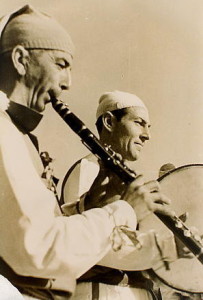 The ‘Ndrezzata is a kind of popular epic poem, a song of war and victory, an elegy warrior type, represented by the launch of the blows with swords and “mazzarielli” as well as love. Greek elegy, the poet or reciter uttered the composition, while a flute used to accompany and emphasize the recited. Reciter, flute and choir are also present in the ‘Ndrezzata. In fact, the text is the only place certain fact, the text is the only certain element from which to try to solve the question about the meaning and the period of training. Of the epic poem has, in fact, the kind of opening, the so-called preface: “I come from Monte Cupo / to give you a great greeting / I come from Tarantiello / cu ‘nu na lanza and spurtiello. / We are three brothers, .. /. Monte Cupo refers to the old Moropano. I come from Tarantiello indicates the historical origin of the poet or reciter of the saga moropanese, certainly in the context of the Hellenic colonization who founded the Magna Grecia and Pitecusa. And speaking of Buonopane the distinguished scholar and archaeologist Don Pietro Monti writes: “From the historical side
The ‘Ndrezzata is a kind of popular epic poem, a song of war and victory, an elegy warrior type, represented by the launch of the blows with swords and “mazzarielli” as well as love. Greek elegy, the poet or reciter uttered the composition, while a flute used to accompany and emphasize the recited. Reciter, flute and choir are also present in the ‘Ndrezzata. In fact, the text is the only place certain fact, the text is the only certain element from which to try to solve the question about the meaning and the period of training. Of the epic poem has, in fact, the kind of opening, the so-called preface: “I come from Monte Cupo / to give you a great greeting / I come from Tarantiello / cu ‘nu na lanza and spurtiello. / We are three brothers, .. /. Monte Cupo refers to the old Moropano. I come from Tarantiello indicates the historical origin of the poet or reciter of the saga moropanese, certainly in the context of the Hellenic colonization who founded the Magna Grecia and Pitecusa. And speaking of Buonopane the distinguished scholar and archaeologist Don Pietro Monti writes: “From the historical side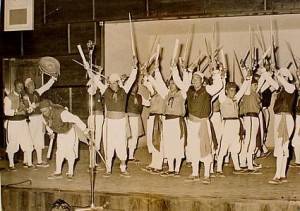 Buonopane is the most important fraction of the town of Forio. The discovery of some fragments of pottery Protocorinthian lets us predict a Greek penetration much older. Perhaps the origin of its founding, more than the need to cultivate the soil, there was a purely economic factor: clay, plastic industry vessels. The hill is rich in natural resources Jetto argilliferi and clay was the material basis of the industrial and commercial Pithecusani. ” And the choir that accompanies the warrior dance (Trallera, trallera .. ‘treia u,’ u … treia Pititum, tindum, Tindera .. etc..) Appears in mixing onomatopoeic, clearly deriving from Greek, Hellenic memory ( see also Calimera, location near Fontana, and ancient dialect expressions like, similar). That the preface of the poem wishes to report the historical memory of the people moropanese is confirmed by the “corporal” (or reciter) of ‘Ndrezzata, the late Fiore Di Iorio (father of previous
Buonopane is the most important fraction of the town of Forio. The discovery of some fragments of pottery Protocorinthian lets us predict a Greek penetration much older. Perhaps the origin of its founding, more than the need to cultivate the soil, there was a purely economic factor: clay, plastic industry vessels. The hill is rich in natural resources Jetto argilliferi and clay was the material basis of the industrial and commercial Pithecusani. ” And the choir that accompanies the warrior dance (Trallera, trallera .. ‘treia u,’ u … treia Pititum, tindum, Tindera .. etc..) Appears in mixing onomatopoeic, clearly deriving from Greek, Hellenic memory ( see also Calimera, location near Fontana, and ancient dialect expressions like, similar). That the preface of the poem wishes to report the historical memory of the people moropanese is confirmed by the “corporal” (or reciter) of ‘Ndrezzata, the late Fiore Di Iorio (father of previous 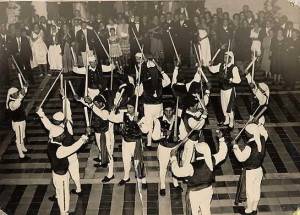 Corporal Thomas), when he responded to the Secretary of Manzini who first had questioned him, after the execution carried out in one afternoon in September 1954 in honor of Catholic writers guests on the island of Ischia: “Excel, is’ na Greek dance.” In addition, as in the epics or classics in Greek elegies, here is the inevitable element of love and at the same time the profile clearly warlike, war, figured by the powerful synchronous launch of shots, which also includes the women, which are also threatened by fearsome incursions by hostile nations and highly motivated. Appears rather general statement of G. Jasolino, Calabrian doctor of the sixteenth century that “explored the island of Ischia for 32 years,” who in his book on “Natural Remedies d’Ischia” to
Corporal Thomas), when he responded to the Secretary of Manzini who first had questioned him, after the execution carried out in one afternoon in September 1954 in honor of Catholic writers guests on the island of Ischia: “Excel, is’ na Greek dance.” In addition, as in the epics or classics in Greek elegies, here is the inevitable element of love and at the same time the profile clearly warlike, war, figured by the powerful synchronous launch of shots, which also includes the women, which are also threatened by fearsome incursions by hostile nations and highly motivated. Appears rather general statement of G. Jasolino, Calabrian doctor of the sixteenth century that “explored the island of Ischia for 32 years,” who in his book on “Natural Remedies d’Ischia” to 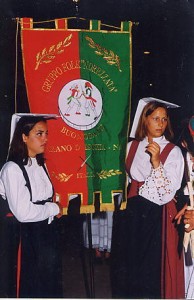 About Forio and “his beautiful women,” he writes. ” In this house that after Forio is the greater of others, people greatly dance of delight: the more that is common in other places. ” And the etymology of Monopane so pronounced: “…. and the other side is another place called Monopane, perhaps so called because in that you ricoglie bonissimo tritico like to say one bread.” It should be noted that in all the epic poems the writers or creators tell the extraordinary feats performed by men (and women), which attaches to each people its past. In reality they are also, of course, transfigured by the memory and the imagination of poets, enriched by the historical memory of their origins. The ancient epic poetry had been handed down orally from generation to generation, sung or recited to the accompaniment of musical instruments and only later written in poetic form. And the people that preserve the integrity of their traditions are those mountains. Finally, we do not believe the meaning of ‘Ndrezzata an “expression of the dance battle of the sexes”,
About Forio and “his beautiful women,” he writes. ” In this house that after Forio is the greater of others, people greatly dance of delight: the more that is common in other places. ” And the etymology of Monopane so pronounced: “…. and the other side is another place called Monopane, perhaps so called because in that you ricoglie bonissimo tritico like to say one bread.” It should be noted that in all the epic poems the writers or creators tell the extraordinary feats performed by men (and women), which attaches to each people its past. In reality they are also, of course, transfigured by the memory and the imagination of poets, enriched by the historical memory of their origins. The ancient epic poetry had been handed down orally from generation to generation, sung or recited to the accompaniment of musical instruments and only later written in poetic form. And the people that preserve the integrity of their traditions are those mountains. Finally, we do not believe the meaning of ‘Ndrezzata an “expression of the dance battle of the sexes”, 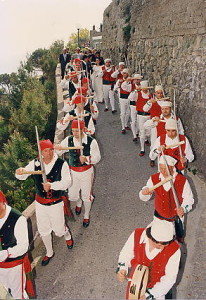 in an alleged Teutonic derivation, which appears to be entirely invented and arbitrary. Meanings and expressions, which are quite far away from the character of the human and ethical moropanese and, moreover, by the war meaning and love of dance. And then the ‘Ndrezzata is traditionally reserved for an exclusive group of families, such as Di Costanzo Di Iorio, Di Meglio, Florio, Migliaccio, Napoleon. At the same time, we reject scurrilous and vulgar expressions which, they say, then eliminated or corrected, as far away from the context in which the ‘Ndrezzata appears to be strongly entrenched.
in an alleged Teutonic derivation, which appears to be entirely invented and arbitrary. Meanings and expressions, which are quite far away from the character of the human and ethical moropanese and, moreover, by the war meaning and love of dance. And then the ‘Ndrezzata is traditionally reserved for an exclusive group of families, such as Di Costanzo Di Iorio, Di Meglio, Florio, Migliaccio, Napoleon. At the same time, we reject scurrilous and vulgar expressions which, they say, then eliminated or corrected, as far away from the context in which the ‘Ndrezzata appears to be strongly entrenched.| M | T | W | T | F | S | S |
|---|---|---|---|---|---|---|
| 1 | 2 | 3 | 4 | |||
| 5 | 6 | 7 | 8 | 9 | 10 | 11 |
| 12 | 13 | 14 | 15 | 16 | 17 | 18 |
| 19 | 20 | 21 | 22 | 23 | 24 | 25 |
| 26 | 27 | 28 | 29 | 30 | 31 | |